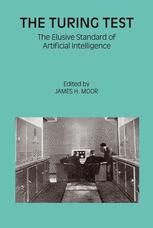

Most ebook files are in PDF format, so you can easily read them using various software such as Foxit Reader or directly on the Google Chrome browser.
Some ebook files are released by publishers in other formats such as .awz, .mobi, .epub, .fb2, etc. You may need to install specific software to read these formats on mobile/PC, such as Calibre.
Please read the tutorial at this link: https://ebookbell.com/faq
We offer FREE conversion to the popular formats you request; however, this may take some time. Therefore, right after payment, please email us, and we will try to provide the service as quickly as possible.
For some exceptional file formats or broken links (if any), please refrain from opening any disputes. Instead, email us first, and we will try to assist within a maximum of 6 hours.
EbookBell Team

5.0
70 reviewsIn 1950 Alan Turing (1912-1954) published his famous article, "Computing Machinery and Intelligence" in the journal Mind. This article is arguably the most influential and widely read article in the philosophy of artificial intelligence. Indeed, most of the debate in the philosophy of artificial intelligence over the last fifty years concerns issues that were raised and discussed by Turing. Turing's genius was not only in developing the theory of computability but also in understanding the impact, both practical and philosophical, that computing machinery would have. Turing believed that computers, if properly designed and educated, could exhibit intelligent behavior, even behavior that would be indistinguishable from human intelligent behavior. His vision of the possibility of machine intelligence has been highly inspiring and extremely controversial. In this classic article Turing presented his well known imitation game and predicted that about the year 2000 "an average interrogator will not have more than 70 per cent chance of making the right identification after five minutes of questioning" in the imitation game. Based on the results of the Loebner 2000 contest and the accomplishments in the field of AI, as impressive as they are, Turing's prediction remains unfulfilled.